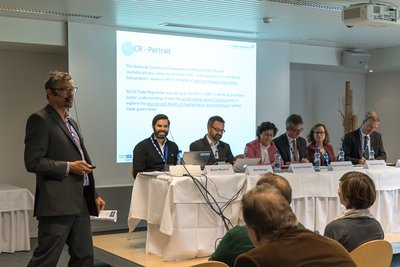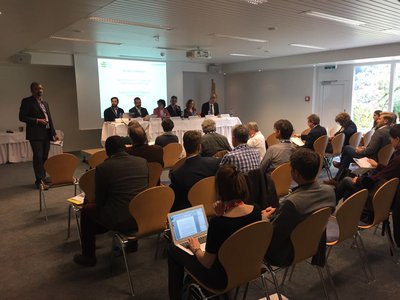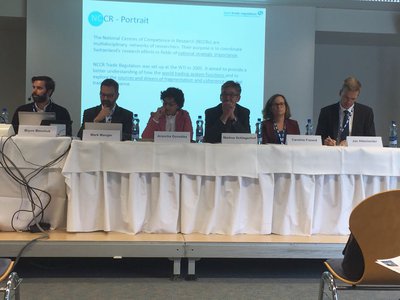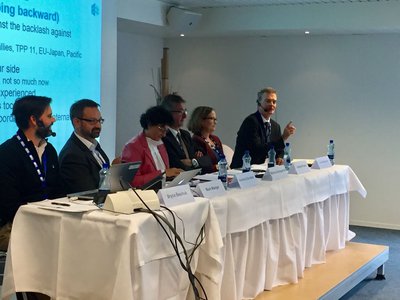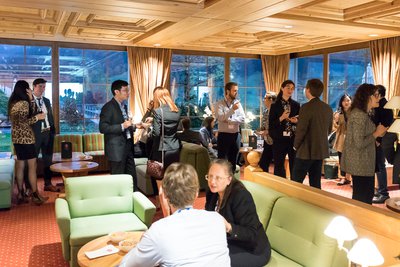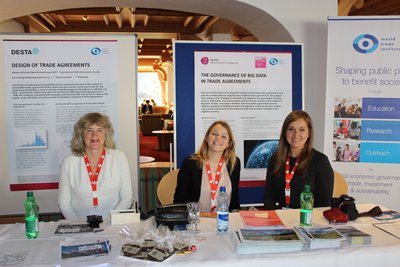7 Oct 2017
World Trade Forum gets to grips with trade policy in turbulent times
The annual World Trade Forum held on 6 and 7 October in Grindelwald, Switzerland marked the culmination of the 12-year WTI-hosted NCCR Trade Regulation research project.
The theme of the 2017 Forum was ‘Trade Policy in Turbulent Times’. Researchers from the six work packages took part, along with academics and trade practitioners.
Over its 12 years, the NCCR Trade Regulation has sought to explore the drivers of fragmentation and coherence in the world trading system. Now, at a time of growing protectionism and anti-globalisation, there is a move towards greater fragmentation.
The first plenary session was on ‘The Crisis of Globalisation: the Rise of Populism and a More Fragmented Trade World?’. Beginning the discussion, Mark Manger of the University of Toronto said that while the United States trade deficit was seen by President Trump as something that had to be tackled, it was in fact nothing new and was not an important issue economically. The populist backlash was really about the loss of manufacturing jobs. The US was engaging in defensive, protectionist measures instead of engaging on the issue of trade. Caroline Freund of the Peterson Institute, Washington, agreed that it was a myth to think that trade was the cause of middle-class woes in the US. The rise of populism was due to a confluence of factors, including economic and tax issues, but also terrorism. But support for trade was at an all-time high. Arancha Gonzalez of the Geneva-based International Trade Centre commented that in the 21st century technology is creating new opportunities but that these are not as visible as lost jobs.
Markus Schlagenhof of the Swiss State Secretariat for Economic Affairs, SECO, talked about the WTO, saying it was an effective way to combat protectionism. As a regulatory framework it plays a crucial role but its negotiating function is in bad shape. The WTO as a rule-making body was facing huge challenges. Jan Atteslander of the Swiss business federation, economiesuisse, argued that fragmentation would damage small and poorer economies. The WTO needed better rules to protect these countries.
Trade and climate
Three parallel sessions were followed by the second plenary on Trade and Climate: Challenges and Opportunities. Co-organised with the Oeschger Centre of the University of Bern and chaired by Bryce Baschuk, this involved contributions by Thomas Bernauer of ETHZ, Lise Johnson, Columbia Center on Sustainable Investment, John Odell, University of Southern California and Eric Strobel, University of Bern.
John Odell pointed out that President Trump was out of step with his voters, who mainly favoured the US sticking with the Paris climate agreement. There was also opposition from a number of states including California, which was "going rogue" in setting very ambitious climate goals. Eric Strobel talked about the difference between climatic events and climate change, and how these were driving migrations. Thomas Bernauer highlighted the problems of carbon trading and called for a change in regulatory systems and shifting the focus from carbon production to carbon consumption. Investment treaties could also be reshaped to target climate solutions, Lise Johnson said.
Trade policy for the 21st century
On the second day, the plenary was on the topic: What Trade Policy for the 21st Century? Chaired by Bernard Hoekman of the EUI, it involved Maria Asenius of the European Commission, Soo Yeon Kim of the National University of Singapore, Joakim Reiter of Vodafone and Gregory Shaffer of UC Irvine.
Opening the session, Bernard Hoekman said the world was very different now from the one the WTO was set up to deal with. Maria Asenius commented that in the face of the United States move to protectionism, the European Union would continue to defend open trade. The EU saw globalisation as an opportunity and was engaged in a very ambitious trade negotiating agenda. Soo Yeon Kim discussed the importance of trade in Asia, characterised by the ASEAN economic community and plans for a China-centred trading network and new proposed trade route. Joakim Reiter said trade was more important than ever and pointed to the huge rise in e-commerce. He saw trade politics as the big headache with local and national governments currently unfit to deal with the structural transformation taking place. For his part, Gregory Schaffer stressed the investment that emerging economies have made to trade rules. China had changed 3,000 laws to comply with the WTO, he said.
A number of parallel sessions were also held looking at research outcomes from the different NCCR Trade Regulation work packages and proposed chapters for a book in the World Trade Forum series published by Cambridge University Press.
The event ended with a special workshop on ‘Assessing the Impact of NCCR-Type Research (Policy Implications)’, involving Thomas Cottier of the WTI, Dominique Foray of EPFL and Keith Maskus of the University of Boulder, both of whom served on the NCCR review panel. Professor Cottier, who led the first two phases of the NCCR, said what he was most proud of was the large number of PhD students it had trained and the network of trade experts it had built up.
The World Trade Forum is co-organised with the European University Institute, Florence and the Centre for Economic and Policy Research (CEPR).
For programme details, see the attachment.
Further info
Programme
Event photos


